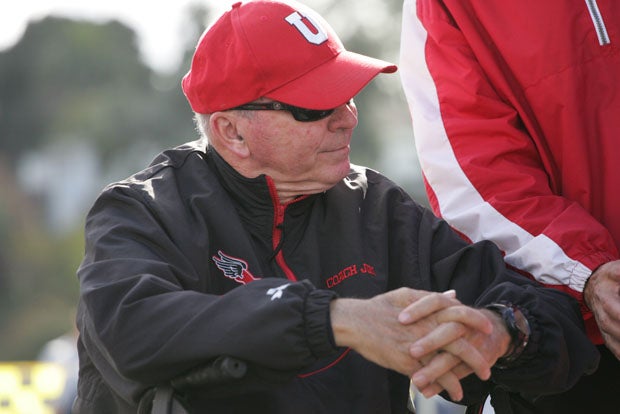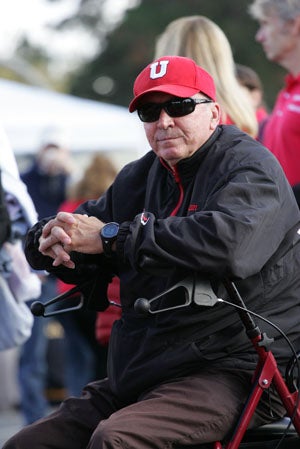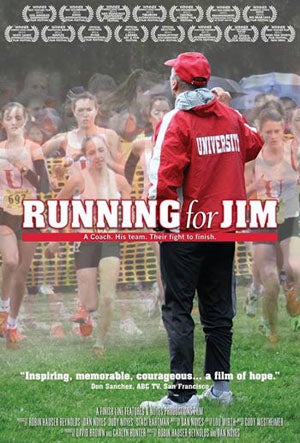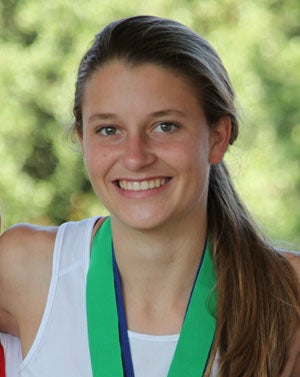
Jim Tracy battled Lou Gehrig's Disease for almost four years, but never lost his love for running and coaching. Tracy, 63, died Sunday night after leading the University (San Francisco) girls to 10 state cross country championships.
Photo courtesy of Jonathan Hawthorne
Athletic Director Jim Ketcham needed someone to spark a pep rally in January, so he called a man who was dying.
This was, of course, no ordinary gent. It was Jim Tracy.
Diagnosed with Lou Gehrig's disease in June of 2010, Tracy had more vigor and zest for life than anyone Ketcham could think of.

Jim Tracy while leading University to a
state title in 2011.
Photo by Jonathan Hawthorne
Sure enough, the state's winningest crosscountry coach delivered a rousing speech to inspire the boys basketball team to victory against rival Lick-Wilmerding in their annual game at Oracle Arena.
"There's no point to go all that way and lose," Tracy told the students. "Go fight the traffic and Lick and come home a winner."
Tracy, who lost his battle with ALS on Sunday night, never apologized for winning. He won 10 Division V state cross country titles – more than anyone — and a combined 34 North Coast Section crowns, believed to be the most by any coach in any NCS sport.
But asking him to defeat ALS was simply an impossible task. He beat it in one respect. Some victims lose all use of every limb right down to their ability to speak. And the evil disease that it is, it doesn't destroy one's brain cells – making it a cruel aware existence with absolutely no control.
Tracy beat that stage. According to Ketcham, he died peacefully in his sleep on Sunday night. Last week Tracy told friends that he'd had trouble breathing.
"To be honest, we didn't see it coming quite this fast," Ketcham said. "There's a finality to it that is very sad. … But at the same time he was able to coach four years and eight seasons after he first told his team that he had ALS. Those extra years were a blessing for our school and our athletes."
His fight and dedication to the sport and his runners gained national and even worldwide attention after his No. 1 runner in the 2010 state finals, Holland Reynolds, fell 10 yards from the finish line. She was stricken with dehydration and hypothermia.
Inspired by Tracy and his condition, she crawled over the line to secure the team's then-eighth state title before getting rushed to an ambulance.
The story reached
MaxPreps, the
New York Times and
ESPN within a week. New York Giants coach
Tom Coughlin used it to inspire his team to a 2012 Super Bowl and Reynolds' mother Robin Hauser Reynolds, a filmmaker, co-directed an award-winning documentary entitled "
Running for Jim," that has been screened as far away as India, Russia and Italy.

A "Running for Jim" documentary poster
Courtesy photo
Hauser Reynolds got the news Monday while in Florida, two days before her film was shown at the Palm Beach International Festival. She just had lunch with Tracy on Saturday.
"I'm shocked and saddened," she said. "But what I know of ALS, it could have been so much worse. Dying peacefully is such a blessing. So too was it to call him my friend. He inspired all of us in so many ways. He was so brave. I never heard him complain. He really never complained."
A standout runner at Archbishop Riordan (San Francisco) and at Cal, Tracy didn't start coaching until his 40s, taking an assistant job at University in 1994. He led the program to its last two NCS and state crowns while confined to a wheelchair, a cruel blow considering how active he was until the diagnosis.
He used to train with the team into his 50s. He loved to run. He loved the outdoors. He loved to coach.
"It's a huge loss," NCS Commissioner Gil Lemmon said. "He meant so much to the cross country and track communities. The (NCS) award ceremonies just won't feel the same without him.
"After his diagnosis he never came across bitter or angry. It just seemed like a bump in the road. He dealt with it in such a dignified way. I really admire him for that."
The news of Tracy's passing probably hit Holland Reynolds, now a sophomore runner at Colgate, the hardest. Her act of courage, something she always downplayed, brought the greatest awareness to Tracy's plight. Her crawl was symbolic of Tracy's struggle to just get through each day. Her finish paralleled Tracy's late life.
Of course, it wasn't in her conscience. She was just trying to finish a race. Like Tracy always taught her.
She took solace in knowing Tracy was seen in the middle of the infield at a track meet just two weeks ago.
"He did what he loved to do right to the end," she said. "And that makes me feel good. … I just wish I could have told him one last time how important he was to me, but I think he knew."
He did, of course. Just as he knew everyone in the tight University and cross country circles did.

Holland Reynolds
Courtesy photo
Not only did Ketcham and University find a way to keep him coaching, they set up a special needs fund for Tracy, raising enough money for him to reside in a two-bedroom apartment in the Presidio area of San Francisco. That's not chump change.
"I've lived my whole life renting small rooms from people," he told us two years ago. "Now I have more stuff than I've ever owned. It's really rather odd. Sometimes I just have to laugh. Before I didn't have anything and now I have everything."
Ketcham can breathe a little easier today reading that statement.
"One thing we will always be grateful for here is that we were able to show coach Tracy in his final years how loved and valued he was by our community."
And thanks to "Running for Jim," Tracy's life and spirit is everlasting.
"His legacy will live on forever," said Holland Reynolds.
